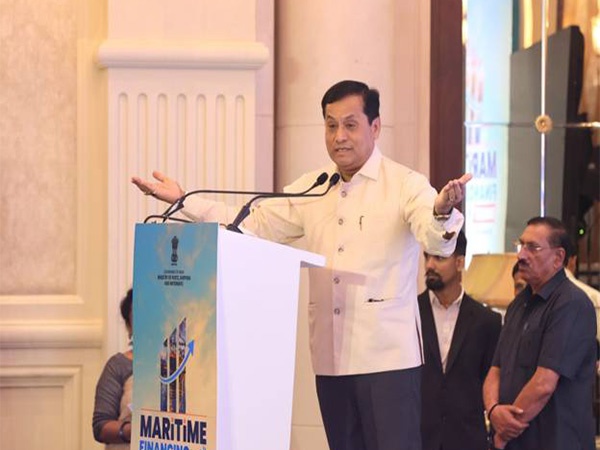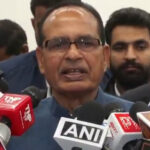New Delhi [India] : The Ministry of Ports, Shipping & Waterways successfully hosted the Maritime Financing Summit 2025 today in New Delhi, bringing together senior policymakers, industry leaders, global investors and domain experts to deliberate on transformative financial strategies for India’s maritime future.
The summit aligns with the Maritime Amrit Kaal Vision (MAKV) 2047, which seeks to position India among the world’s leading maritime powers by strengthening shipbuilding, port infrastructure and financial resilience, Ministry of Ports, Shipping and Waterways said.
The keynote address was delivered by Sarbananda Sonowal, Union Minister of Ports, Shipping and Waterways after the event was commenced with an opening address by T.K. Ramachandran, Secretary, MoPSW, followed by a special address from Shantanu Thakur, Minister of State for Ports, Shipping and Waterways.
Delivering the keynote address, Union Minister Sarbananda Sonowal said, “India, as a maritime nation, is undergoing a transformative shift backed by strong policy support and growing investment momentum. Under the dynamic leadership of Hon’ble Prime Minister Narendra Modi ji, we are pursuing the vision of a developed India by 2047 Viksit Bharat with the maritime sector playing a pivotal role.”
“Our ports have significantly improved operational efficiency, with the average turnaround time reduced from 4 days to less than 1 day, outperforming many advanced nations. Container capacity at major ports has grown by over 70%, and cargo volumes through coastal and inland waterways have multiplied. With 100% FDI permitted in shipping under the automatic route, simplified customs clearance and the strategic advantage of GIFT City IFSC, India now offers one of the most attractive investment ecosystems in the maritime domain. Our goal is clear to make India a global maritime hub not just in trade, but also in finance, shipbuilding and green maritime infrastructure”, he added,
In his address, Minister of State Shantanu Thakur added, “India’s maritime ambitions cannot be fulfilled without reliable, long-term financial foundations. Today’s summit is not just about sharing ideas, it’s about building trust between industry and institutions. We are committed to ensuring that enabling policies, business-friendly reforms and international partnerships create an environment where Indian shipping can grow and lead. Our coastline is a gateway to opportunity, and through shared vision and effort, India will emerge as a global maritime leader.”
Another key announcement was the proposed Maritime Development Fund (MDF), a dedicated blended finance vehicle aimed at lowering capital costs and attracting long-term investment into shipyards, coastal infrastructure and inland waterways. The MDF has been developed through wide-ranging consultations with over 100 stakeholders, including global investors, shipowners, insurance companies and financial institutions.
Policy measures such as recognising large vessels as infrastructure assets, extending the Shipbuilding Financial Assistance Scheme (SBFAS) to overcome the cost disadvantage and provide a long term visibility on the financial incentives available in the sector and enabling ship leasing through GIFT City IFSC were discussed as transformative steps to enhance India’s global competitiveness in the maritime and shipbuilding sectors.
It was highlighted that policy initiatives such as the Merchant Shipping Bill and the Coastal Shipping Bill are being pursued to support Indian-flagged tonnage. Parliament passed Bills of Lading Bill 2025 which aims to simplify legal framework for shipping documents.
Capital support for greenfield capacity expansion involving the creation of new shipbuilding clusters and brownfield expansion to enhance existing shipyards’ capacity through a coordinated approach between the Centre and States, is envisioned.
The summit featured discussions focused on innovative financing mechanisms, digital maturity of port operations, regulatory frameworks for ship leasing and ownership, insurance innovation, and sustainable shipbuilding and recycling. A major highlight was the launch of the Financial Digital Maturity Matrix (FDMM), a comprehensive framework to evaluate and elevate digital financial capabilities at major ports, enabling investor-ready, high-performance infrastructure.
T.K. Ramachandran, Secretary, MoPSW, stated: “The India Maritime Financing Summit marks a defining moment in our efforts to create a self-reliant and globally competitive maritime economy. Over the past year, we have collaborated closely with stakeholders to co-develop a four-pillar strategy focused on financing, capacity-building, demand generation and skills enhancement. As we now move toward execution, coordinated public-private cooperation will be the key. This summit represents a significant stride in turning vision into action.”
The event witnessed broad-based participation around 250 stakeholders across the maritime ecosystem. Financial institutions formed the largest group of attendees, followed by shipyards, consultants and shippers. There was also notable representation from shipping companies, foreign embassies, and industry associations, demonstrating a well-rounded presence across the maritime value chain, from component manufacturers to academic experts.
Eminent representatives spanned across embassies from countries including Norway, Italy, Greece, Singapore, Netherlands, Japan, Germany, Denmark, Australia and Cyprus; state maritime boards (with key officials from Gujarat, Maharashtra, and Andhra Pradesh); and leading shipbuilding firms such as Cochin Shipyard, Damen, Chowgule & Co. and Swan Defence. Prominent shipowners included SCI, AP Moller-Maersk, CMA CGM, and San Maritime.
The summit also hosted executives from component manufacturing firms like BEML and Marine Electricals, ship management players like Union Marine, classification societies such as DNV, Lloyd’s Register, and IRS, and top financial institutions and funds including NaBFID, NIIF, IIFCL, NEO and Climate Fund Managers.
The summit also benefited from the insights of key dignitaries and experts, including R. Lakshmanan, Joint Secretary, Ports; Venkatesapathy S., Joint Secretary, Shipping; and CEOs of State Maritime Boards Rajkumar Beniwal, Gujarat, Pradeep P., Maharashtra and Praveen Adithya, Andhra Pradesh. Thematic sessions were enriched by contributions from banks, insurance firms, IFSCA and the Sagarmala Finance Corporation.
The event concluded with closing remarks from Rajesh Kumar Sinha, Special Secretary, MoPSW, who reaffirmed the Ministry’s focus on financial innovation, institutional capability and aligned policy frameworks to drive forward the Maritime Amrit Kaal Vision 2047. (ANI)

















